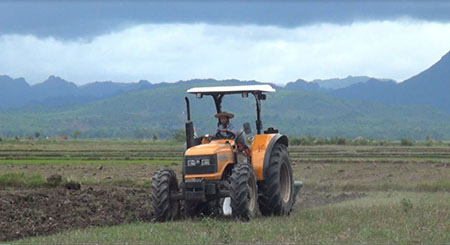Five farmers who led and were involved in a ploughing protest in So-Hlar-Ku village, Phruso Township, Karenni State in May were prosecuted by the Burma Army and went on trial for trespass on 14 January.
Ploughing protests are a form of protest farmers take when land has been confiscated from them. They return to their confiscated land and symbolically plough it, even though they no longer have rights to use the land.

In this case Light Infantry Battalion (LIB) 531 seized 1,289 acres from farmers in So-Hlar-Ku Village, which prompted 300 farmers from So-Hlar-Ku Village to carry out a ploughing protest on 27 May 2014.
Following the protests LIB 531 decided to prosecute five of the ringleaders under Section 477, a law against trespass. Their case started being heard at Phruso Township Court in Karenni State on 14 January.
The farmer’s lawyer Ma Nan Thet Thet Wai said: “They have been accused of and put on trial for ploughing with the intention of taking back army owned land in contravention of Section 477, it is a trespass case.”
Ko Tureh from So-Hlar-Ku village, one of the accused said that if the state government had resolved the land dispute there would be no need for this trial, which has progressed from the initial prosecution by the army to a trial.
He said: “We will face the court of law. We are ready and will face the court if the laws are fair but if the laws are not fair to grassroots people we will resist by using people power.”
Five people, Sayar Thereh from Law-Jar village, Ko Tureh, U Sureh, Shar Reh and Mereh from So-Hlar-Ku village, are being put on trial under section 477 for taking part in the plough protest.
U.Sureh is facing two charges as he took part in ploughing protests on 24th and 27th May. The other four defendants are only facing one charge each. The court will preside over six prosecutions involving five people said U Zin Lin Thant a judge from Phruso Township.
The judge explained to Kantarawaddy Times that five people were facing six charges and how many sessions the court would have to sit for would depend on how many witnesses were called. If there were not too many witnesses the case could be concluded in fewer court sessions. If there were many witnesses the case would have to stretch to more sessions, with the defendants being questioned first and the witnesses being questioned in subsequent sessions. The judge said that if there were only a few witnesses the case might take three or four court sessions, if there are more witnesses it could take longer.
In Burma court sessions last two weeks and if a case is not concluded within that session another two-week session has to be convened. Normally there is a two-week wait between sessions and straightforward cases normally take four or five sessions, meaning they last from about three to four months
Translated by Aung Myat Soe English version written by Mark Inkey for BNI



